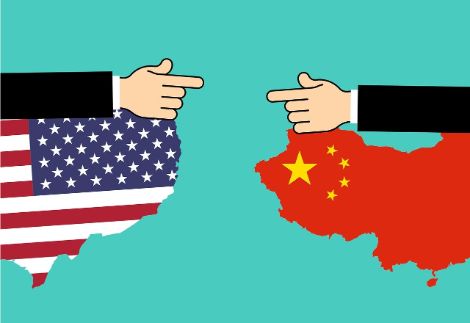Where are relations headed?
Despite the recent signing of their Phase 1 Trade Deal last year, the USA-China relationship appears to be in a poor state, with President Trump lashing out publicly to accuse China of responsibility for the Covid-19 outbreak in the US.

Whether this is pre-election bluster or the beginning of the end for a working relationship between the two countries remains to be seen.
We examine some key components of of the crisis to see what might happen next.
CHINA’S OPPORTUNITY TO GRAB POWER? OR TO LEND A HELPING HAND?
Because the Covid-19 epidemic began in China, China had what might be called a head start on tackling this virus.
Whether or not China made the threat to the rest of the world known in good time is a matter of debate, but certainly the current situation is one in which China is in fast recovery mode, while America is still in the depths of the pandemic.
This creates an imbalance of power in which China is able to manufacture and thrive – in some cases producing solutions to the pandemic to be shipped out around the world – while other countries (notably the USA) are not yet re-opened and are facing huge economic problems.
Is China taking advantage of the current situation for its own gain? Or is China assisting the rest of the world to tackle a pandemic we are all suffering together? This may depend on your point of view, but it also depends on the moves China makes next.
‘THE CHINESE VIRUS’
Donald Trump’s continual pointing to China as the source of the pandemic is a public relations headache for China, but also for the World Health Organisation. This criticism is not going away, and has now become part of the public discourse.
The WHO’s handling of the pandemic, and its seemingly lenient and ineffective response to China, has led to intense criticism and a halt in US funding to the organisation.
China are not as large a funder to the WHO as America, but they are rapidly increasing their donations while the US appears to be less invested.
Citizens in China who initially spread ‘rumours’ about the virus were admonished by Chinese officials, meanwhile the WHO recommended against closing borders or restricting travel. These courses of action have not aged well.
Critics therefore argue that the WHO’s subsequent praising of China’s ‘openness’ in handling the epidemic is a clear sign that any valid criticism of the country over this situation will never be forthcoming.
WHAT NEXT?
The upcoming US election results in November will signal the direction of travel for US-China relations even more than the outcome of the pandemic.
Democrat Joe Biden’s campaign criticises Donald Trump’s early responses to China over Covid-19 (at a time when it must be said that Trump was in line with WHO advice).
Donald Trump’s campaign, meanwhile, criticises Biden’s track record on China, and also highlights Biden’s early outcry at Trump for closing US borders to Chinese nationals – a call made by Trump before such an action was more widely recommended.
Trump’s ‘America First’ ethos seems like a genuine commitment at all costs. How this squares with trade and cooperation with another world power post-pandemic is what remains to be seen.
